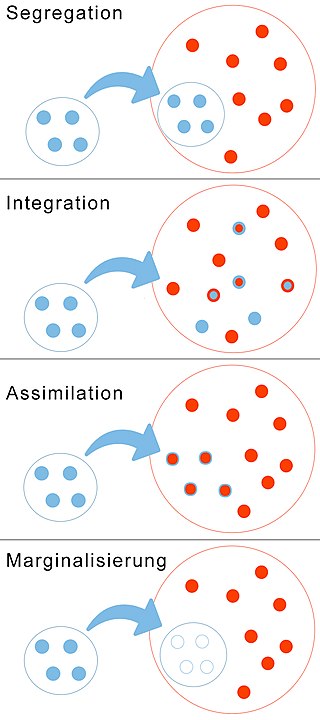Related Research Articles

Psychology is the scientific study of mind and behavior in humans and non-humans. Psychology includes the study of conscious and unconscious phenomena, including feelings and thoughts. It is an academic discipline of immense scope, crossing the boundaries between the natural and social sciences. Psychologists seek an understanding of the emergent properties of brains, linking the discipline to neuroscience. As social scientists, psychologists aim to understand the behavior of individuals and groups. Ψ (psi), the first letter of the Greek word psyche from which the term psychology is derived, is commonly associated with the science.

Acculturation is a process of social, psychological, and cultural change that stems from the balancing of two cultures while adapting to the prevailing culture of the society. Acculturation is a process in which an individual adopts, acquires and adjusts to a new cultural environment as a result of being placed into a new culture, or when another culture is brought to someone. Individuals of a differing culture try to incorporate themselves into the new more prevalent culture by participating in aspects of the more prevalent culture, such as their traditions, but still hold onto their original cultural values and traditions. The effects of acculturation can be seen at multiple levels in both the devotee of the prevailing culture and those who are assimilating into the culture.
Quantitative psychological research is psychological research that employs quantitative research methods.
The Doctor of Education is a research or professional doctoral degree that focuses on the field of education. It prepares the holder for academic, research, administrative, clinical, or professional positions in educational, civil, private organizations, or public institutions.

School psychology is a field that applies principles from educational psychology, developmental psychology, clinical psychology, community psychology, and behavior analysis to meet the learning and behavioral health needs of children and adolescents. It is an area of applied psychology practiced by a school psychologist. They often collaborate with educators, families, school leaders, community members, and other professionals to create safe and supportive school environments.
Situated cognition is a theory that posits that knowing is inseparable from doing by arguing that all knowledge is situated in activity bound to social, cultural and physical contexts.
Nathaniel Lees Gage was an American educational psychologist who made significant contributions to a scientific understanding of teaching. He conceived and edited the first Handbook of Research on Teaching, led the Stanford Center for Research and Development of Teaching, and served as president of the American Educational Research Association. Gage was a professor at the Stanford Graduate School of Education, where he moved in 1962 after 14 years at the University of Illinois. Deborah Stipek, dean of the Stanford School of Education, called Gage a "giant among educational researchers." David C. Berliner, Regents' Professor of Education at Arizona State University, called Gage "the father of the field of research on teaching."
In psychology, constructivism refers to many schools of thought that, though extraordinarily different in their techniques, are all connected by a common critique of previous standard approaches, and by shared assumptions about the active constructive nature of human knowledge. In particular, the critique is aimed at the "associationist" postulate of empiricism, "by which the mind is conceived as a passive system that gathers its contents from its environment and, through the act of knowing, produces a copy of the order of reality".
John Widdup Berry is a psychologist known for his work in two areas: ecological and cultural influences on behavior; and the adaptation of immigrants and indigenous peoples following intercultural contact. The first is broadly in the domain of cross-cultural psychology; the second is in the domain of intercultural psychology.
Martha E. Bernal was an American clinical psychologist. She earned her doctoral degree at Indiana University Bloomington in 1962. She was the first Latina to receive a doctorate degree in psychology in the United States. She helped with the treatment and assessment of children with behavioral problems and worked to develop organizations that have a focus on ethnic groups.
Gary Cziko is an American researcher, and author in the field of educational psychology at the University of Illinois at Urbana–Champaign who has worked on the philosophical model known as perceptual control theory (PCT) – a model whose original developer, William T. Powers, was his mentor. He has written two introductory books on the subject, and in 1995 he introduced the concept of "universal selectionism" into the PCT model.
Hal Pashler is Distinguished Professor of Psychology at University of California, San Diego. An experimental psychologist and cognitive scientist, Pashler is best known for his studies of human attentional limitations. and for his work on visual attention He has also developed and tested new methods for enhancing learning and reducing forgetting, focusing on the temporal spacing of learning and retrieval practice.

Linnea Carlson Ehri, Ph.D. is an American educational psychologist and expert on the development of reading. She is a Distinguished Professor Emerita of Educational Psychology at the Graduate Center of the City University of New York (CUNY). Ehri is known for her theory of orthographic mapping, which describes the process of forming "letter-sound connections to bond the spellings, pronunciations, and meanings of specific words in memory" that underlies fluent reading. As a consequence of orthographic mapping, written words are tightly linked with their pronunciations and meanings in memory and can be recognized by sight.

The immigrant paradox in the United States is an observation that recent immigrants often outperform more established immigrants and non-immigrants on a number of health-, education-, and conduct- or crime-related outcomes, despite the numerous barriers they face to successful social integration.
Batja Mesquita is a Dutch social psychologist, a cultural psychologist and an affective scientist. She is a professor of psychology at the University of Leuven, Belgium, where she studies the role of culture in emotions, and of emotions in culture and society. She is director of the Center for Social and Cultural Psychology in Leuven.
Susan Elaine Emley Keefe is an American anthropologist and author. She is a professor emerita at Appalachian State University. Keefe has published books on Mexican-American culture and Appalachian health issues.

Kevin Cokley is an African-American counselling psychologist, academic and researcher. He is University Diversity and Social Transformation Professor, Associate Chair of Diversity Initiatives, Professor of Psychology at the University of Michigan Ann Arbor. Previously he was the Oscar and Anne Mauzy Regents Professor of Educational Research and Development, Department Chair of Educational Psychology, and Professor of African and African Diaspora Studies at the University of Texas at Austin, where he directed the Institute for Urban Policy Research & Analysis. He was a Fellow of the UT System Academy of Distinguished Teachers and a Distinguished Teaching Professor at the University of Texas at Austin.
Tracey A. Revenson is a health psychologist known for her research on how people cope with chronic illness and how people's lifestyles can affect their health and influence their coping mechanisms. She holds the position of Professor of Psychology at Hunter College and the CUNY Graduate Center, and directs the Coping and health in context (CHiC) lab.
Esteban L. Olmedo is an organizational psychologist who conducted research on acculturation, ethnic minority issues, and mental health. Olmedo was the inaugural director of the Ethnicity, Race, and Cultural Affairs Portfolio at the American Psychological Association (APA).
Margaret Rosario is a clinical psychologist who studies the development of sexual identity and health disparities associated with sexual orientation. Rosario was President of the American Psychological Association (APA) Division 44, the Society for Psychology of Sexual Orientation and Gender Diversity, from 2017-2018. Rosario received the APA Award for Distinguished Contributions to Ethnic Minority Issues in 2008. and the Society for the Scientific Study of Sexuality Distinguished Scientific Achievement Award in 2021.
References
- 1 2 3 4 5 "Guide to the Amado M. Padilla Papers M0497". oac.cdlib.org. Retrieved 2022-11-24.
- ↑ "Amado M. Padilla's Website". web.stanford.edu. Retrieved 2022-11-24.
- ↑ "Amado Padilla's Profile | Stanford Profiles". profiles.stanford.edu. Retrieved 2022-10-20.
- ↑ Padilla, Amado (20 May 1969). An Analysis of Incentive and Behavioral Contrast (Thesis).
- ↑ "Amado Padilla | Center for Latin American Studies". clas.stanford.edu. Retrieved 2022-11-24.
- ↑ "Hispanic Journal of Behavioral Sciences Editorial Board".
- ↑ Padilla, Amado M. (1994). "Research news and Comment: Ethnic Minority Scholars; Research, and Mentoring: Current and Future Issues". Educational Researcher. 23 (4): 24–27. doi:10.3102/0013189X023004024. S2CID 145170528.
- ↑ Singh, Preetina (2022-10-20). "Faculty Rights Tip: What is "Assigned Time for Exceptional Levels of Service to Students"?". California Faculty Association. Retrieved 2022-11-24.
- ↑ "Awards & Honors – Society for the Psychological Study of Culture, Ethnicity and Race" . Retrieved 2022-11-24.
- ↑ "Lifetime Achievement Award (Division 45)". www.apa.org. Retrieved 2022-11-26.